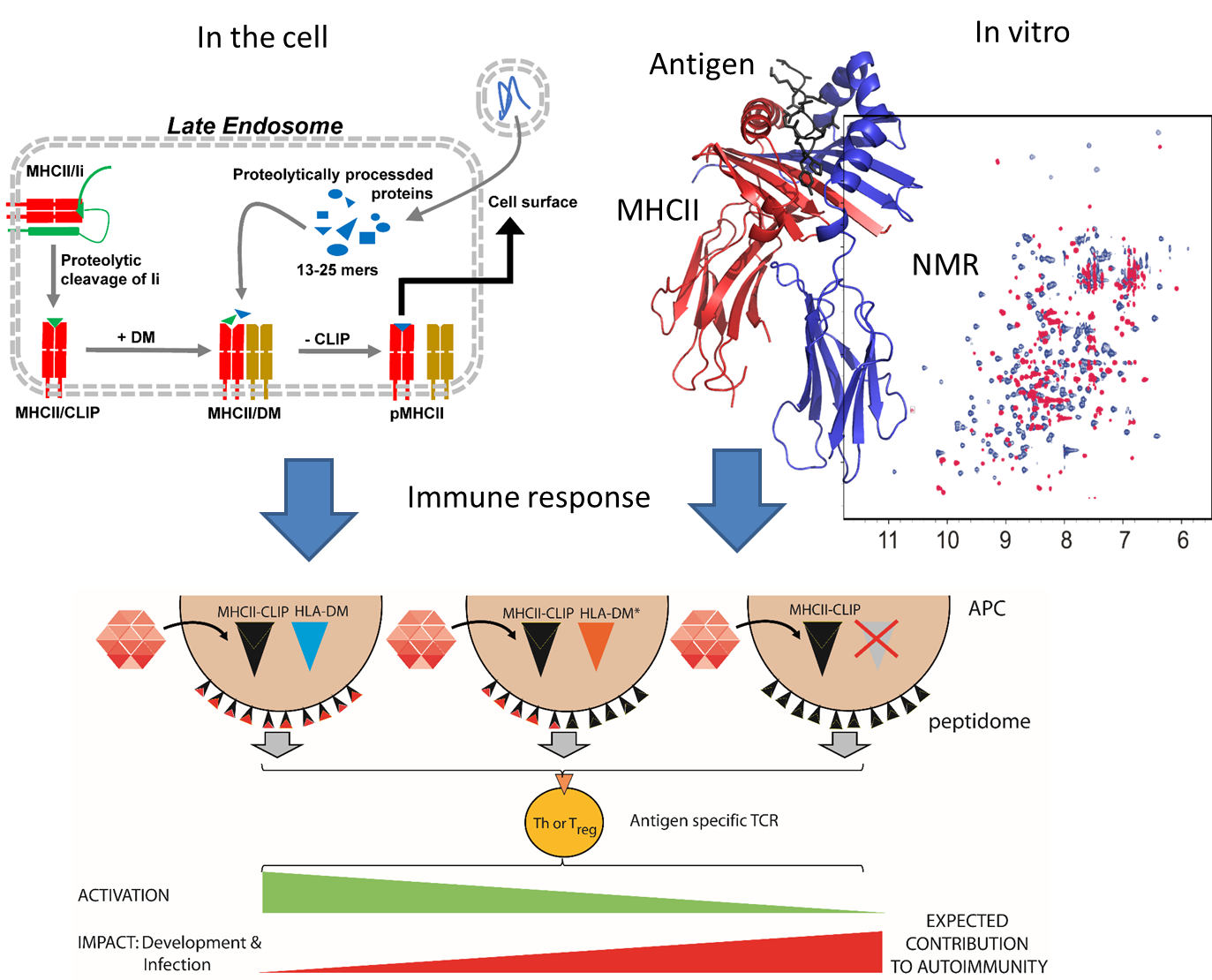Antigen presentation by Major Human Histocompatibility complex (MHC) Class II proteins
CD4+ T cells mediate cellular adaptive immune responses by recruiting and modulating the activity of many effector mechanisms of the immune system. One of the most important requirements for CD4+ T cell activation is the recognition of antigenic peptides presented by Major Histocompatibility complex class II (MHCII) molecules. Professional antigen presenting cells (APCs) are responsible for displaying antigenic peptides on MHCII molecules for CD4+T cell surveillance. Antigens are taken up, proteolytically degraded and loaded onto MHCII molecules in specialized compartments before peptide-MHCII complexes traffic to the cell surface. Peptide loading in such compartments is facilitated by a non-classical MHCII molecule (HLA-DM) whose function can be modulated in specific cell types by the inhibitor HLA-DO. Thus, the pool of peptides displayed by MHCII molecules (peptidome) at a given time point represents the immunological status of an individual. T cells become activated, initiate an immune response and lead to the generation of memory cells characteristic of adaptive immunity. Therefore, antigen presentation by MHCII molecules is an essential event for effectively fighting pathogens or even cancer. The generation of specific MHCII-peptide complexes bears the potential to expand antigen-specific CD4+ T cells, thereby contributing to novel concepts of immunotherapy.
Based on a number of established in vitro and cellular methods our work aims at understanding key mechanisms of antigen processing and presentation related to pathogen immunity. Additionally we want to unravel the contribution of different key players in antigen processing to autoimmunity. To date, we have been focusing on the molecular mechanisms underlying peptide loading/exchange from MHCII molecules using biophysical techniques; however, we have recently extended our scope to study peptide-MHCII complex formation from complex mixtures, and to elucidate the impact of MHCII polymorphisms on antigen loading in reconstituted systems including relevant cellular models.
Structural and dynamic features of MHCII molecules during peptide exchange
MHCII proteins reach the endosomal compartment preloaded with the class-II associated invariant chain peptide (CLIP) where HLA-DM catalyzes the exchange of CLIP for higher affinity antigens. DM-catalyzed peptide exchange determines the fate of immunogenicity of a number of antigens, however, the underlying molecular principles of peptide exchange are not well understood. We could show by a combination of NMR experiments and molecular simulations/Markov state modeling (with the group of Frank Noé, Freie Universität Berlin) how low populated pMHCII conformations dictate the catalyzed and non-catalyzed peptide exchange reactions and we are further interested in the role of how natural polymorphisms and particular antigens affect the proposed mechanistic model. With respect to this, the interference of small molecules, such as known drugs on MHC-peptide presentation and CD4+ T cell response represents an additional MHCII-related research field in our group.
HLA-DM natural variation on disease
The central role of HLA-DM on epitope selection has been long investigated. DM’s few polymorphisms contrast with the high polymorphic degree of classical MHCII. For the first time we have proven that HLA-DM natural variation result in different functionalities of DM as a peptide loading catalyst in vitro. We have also described a potential link of the different DM variants with the persistence of disease-related peptides. In this context we are investigating how natural DM variation affects its cellular function.
Epitope selection and presentation of (auto) immune relevant epitopes
MHCII proteins are encoded by the highest polymorphic gene locus in the human genome, the Human Leukocyte Antigen (HLA) locus, and polymorphisms on MHCII have been genetically and functionally linked to autoimmune disease susceptibilities. However, MHCII polymorphisms do not entirely explain the etiology of a given autoimmune disease. Differences in antigen processing and presentation between APCs in peripheral tissues and those involved in T cells development could be directly related to autoimmunity. We use a combination of in vitro experiments and cell-based assays to evaluate the most important factors selecting certain epitopes involved in autoimmune diseases. We investigate the role of different sets of proteases and of non-classical MHCII proteins.

Relevant methods used for our investigations
We have established methods for recombinant MHCII protein expression and purification from eukaryotic and prokaryotic hosts. We focus on human MHCII alleles which allows us to generate and study more than 40 MHCII proteins. Prokaryotic hosts allow for the selective labelling of proteins required for structural investigations by NMR and eukaryotic expression systems yield proteins used for functional characterization and other applications (e.g. tetramer design). MHCII biochemical characterization includes measuring peptide binding or dissociation (ELISA or Fluorescence polarization) as well as protein-protein interaction (Surface Plasmon Resonance). We use multidimensional NMR techniques to study structural and dynamic properties of MHCII proteins and perform X-ray crystallography in collaboration with the AG Heinemann (MDC Berlin).
Antigen processing and presentation is studied in established cell lines that we genetically engineer (lentiviral transduction) and in collaboration with other researchers we plan to extend our assays to primary human APCs. Mass spectrometry (MALDI-TOF and LC-ESI), flow cytometry and T cell activation assays (restricted hybridomas and T cell clones) are used as readout of our experiments. Microscopy (confocal and life-cell imaging) and other conventional approaches (western blot) are used to gain insights at the molecular level.
Additionally we develop reagents and probes to detect, alter and/or interfere with antigen processing and presentation processes based on protein engineering techniques. Recombinantly expressed proteins are modified by enzyme-mediated reactions to accomplish the incorporation of chemical probes or to increase their valency. We are currently working in cellular settings and plan to extend our studies to relevant animal models.
Collaborators
- Dr. Sebastian Stolzenberg, Dr. Esam Abualrous, Prof. Frank Noe (Freie Universität Berlin)
- Dr. Friederike Ebner, Dr. Sebastian Rausch, Prof. Susanne Hartmann (Freie Universität Berlin)
- Dr. Petra Bacher, Prof. Alexander Scheffold (DRFZ)
- Daniel Wendisch, Dr. Leif E. Sander (Charité)
- Felix Reisbeck, Prof. Reiner Haag (Freie Universität Berlin)
- Dr. Felix Bröcker, Prof Peter H. Seeberger (MPIKG)
- Dr. Yvette Roske, Prof. Udo Heinemann (MDC)
- Prof. Lawrence J Stern (University of Massachussetts, Worcester, MA)
- Prof. Udo Heinemann (MDC Berlin)
